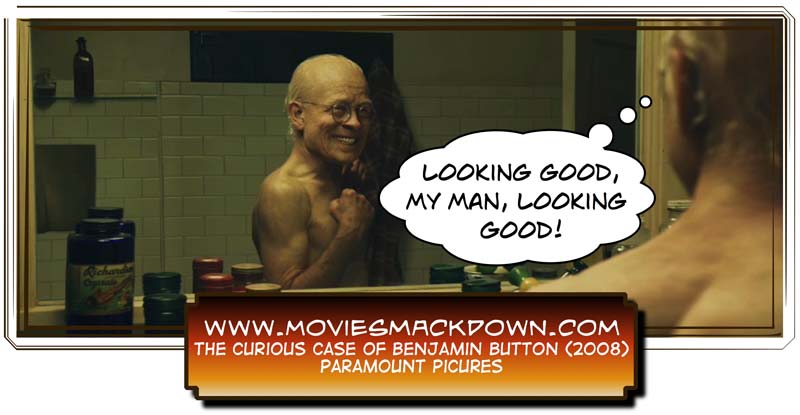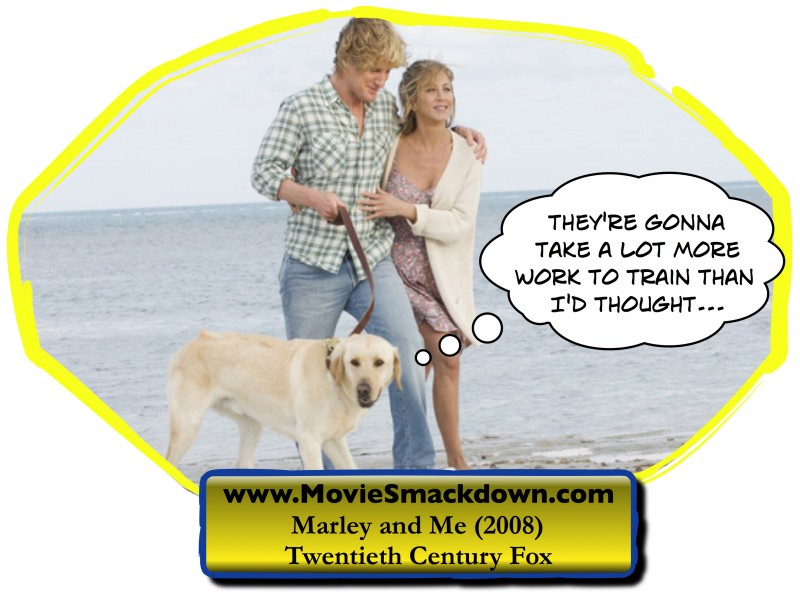 The Smackdown
The Smackdown
The tabloids made me do it. The temptation to compare Brad’s and Jen’s films, both opening on Christmas Day was too much for the Merchants of Venom (and now for me); Jen won Round One of their manufactured box office face-off. But this smackdown has precious little to do with money. Everyone has loved and lost a dog or two, but few have lived life backwards. The artistically ambitious “The Curious Case of Benjamin Button†battles the unapologetically sappy Boy-Meets-Dog-Boy-Loses-Dog crowd-pleaser “Marley & Me.†Both films aim to earn your tears and laughter, and both succeed in some measure. Which tabloid darling most successfully rises above their ubiquity? It’s Brad versus Jen for realsies.
The Challenger
In the already wildly successful “Marley & Me,†Jennifer Aniston and Owen Wilson marry, buy a dog, have some kids, and hit forty. Based on a book compiled of John Grogan’s newspaper columns, the movie is his fairly honest (if not terribly insightful) reflection on a somewhat prickly modern marriage with its requisite ups and downs. It’s “Revolutionary Road†with a puppy and a way better real estate broker. The dog is a total hellion; the world is his all-you-can-eat buffet, and his family adores him beyond all reason as dog-loving families are wont to do.

The Defending Champion
An absolute technical marvel, “The Curious Case of Benjamin Button” starts in 1918 with Benjamin’s birth and ends with his true love Daisy’s death in 2005. Benjamin Button is born an old man, an infant with wrinkled skin and an old man’s face. He lives his colorful life backwards, and his story is told by Daisy on her deathbed as Hurricane Katrina rages just outside. Eric Roth wrote the similarly ambitious “Forrest Gump†as another window on the last century; his “Button†script worked more magically, more elegiacally, for me. The movie is based very very loosely on the conceit in an F. Scott Fitzgerald short story, but Roth has taken the germ of the idea on a very different odyssey. The original story is almost comic, a satiric reflection on generations and conventions of the time. Roth’s and Fincher’s version is lyrical, a prose poem on the last century and mortality and love and the American character.
The Scorecard
Both films purport to tell the story of a whole life. Marley’s life is told from the point of view of his master John from Marley’s rollicking puppyhood to his heartbreaking euthanized demise. Marley ages quite a bit, played by countless dogs that didn’t even slightly resemble each other. I’m not a dog person, but it was quite evident that all those Marleys shared nothing but a breed. Hired for their special “talents†– chewing a couch, straining at a leash, humping a leg, tormenting a babysitter, pooping in the ocean, gazing soulfully – I suppose it would be too much to ask for credible resemblance. They were all spirited white labs, and they delivered exactly what was required.
While the film covers well over a decade in reporter/columnist John Grogan’s life, Owen Wilson plays him as a well-worn variation on his patented Peter Pan; his John makes few concessions to maturing. Life lessons come slowly to this one; his foil, friend and professional rival Sebastian (Eric Dane) would seem to embody a cautionary tale from the get-go. Instead, John doesn’t quite get the I-wouldn’t-trade-places clue from this too-handsome Lothario till the last possible moment. Wilson does change his hairstyle slightly toward the end of the film, wisely ditching an outdated perfectly blonde beachboy shag for a center part version.
Jennifer Aniston doesn’t age either; instead she presents an almost leatherized version of herself, tanned a bizarre shade of mahogany (even running in her wedding gown through a freakish Michigan snowstorm), unnaturally smoothed and tight as a drum. You’ve seen her. She’s appeared naked or nearly naked on countless magazine covers, delivering an ingeniously packaged self to the masses, spilling her innermost “secrets†as willing tabloid fodder for the past months, plugging her little doggie movie that could, and her yeoman’s efforts paid off big Christmas Day.
Her character’s name is Jen too… sometimes Jenny. Aniston’s omnipresence makes it well nigh impossible to separate her tabloid-enhanced image from that of her character. The uncomfortable irony is this: The real Jen has no husband and no children. Her unfortunate stiffness and that all-over tan hardly mask that inalterable, intoxicating tabloid-selling fact but reinforce it. Her real life first husband was famously stolen right from under her immobilized nose; she’s still swatting at the vixen who stole him. Jen’s our perennial girl next-door victim with the famously ticking biological clock. She plays our eternally young Friend Rachel Green countless times a day on our TV screens, perpetually destined for star-crossed love with Ross Geller, and the real Jen doesn’t want to disappoint us by changing a lustrous hair on that iconic head. As a result, she doesn’t play a mother convincingly, and her chemistry with the usually charming Mister Wilson doesn’t quite compute either. It’s easy to believe that Wilson’s John Grogan did love white lab Marley more than anything; his is no inflated deathbed confession. It would be easy to love the worst dog in the world more than the least convincing wife and mother. The tabloids spill over and spoil things a bit, muddying the waters and tainting our response. Owen Wilson’s been no stranger to those mythmakers himself; he’s played one of their most obdurate Peter Pan figures. It’s odd to see him playing a husband and father; since the character is conflicted on both fronts though, his tabloid back-story actually assists the actor in his mission.
There are a few other actors in the movie worth noting: Alan Arkin wrings everything possible from a predictably gruff-on-the-outside, marshmallow-on-the-inside managing editor; his line readings more than elevate the material. Every time this under-used actor gets cast, it’s a revelation. I’m just saying.
Kathleen Turner’s dog trainer qualifies as the scariest cameo of this or any season; she shares a disturbing vocal and visual resemblance to Mickey Rourke in “The Wrestler.†Has she too been boxing for two decades or does she owe her team of surgeons a malpractice subpoena? Rent “Body Heat†if you leave the theater un-alarmed.
Like many newspapers, The Philadelphia Inquirer faces imminent financial ruin; if “Marley & Me†is any indicator, I think I know one of the big reasons why. That house the Grogans buy in Chester Heights is easily worth a cool million; clearly the newspaper’s grossly overpaying their reporters. Seriously. I want that house. And that paycheck.
And not to quibble, dog people, but aren’t the Grogans America’s all-time worst dog-owners? Marley grows up to be the worst dog in the world due to their colossally bad laissez-faire parenting/training. Oh sure, the film is based on John’s confessional columns, but admitting one’s failures isn’t quite the same thing as correcting one’s mistakes. (Fortunately, the three children in the film seem to raise themselves; this system worked out better than one might imagine.)
The internet is buzzing with dog people complaining that Marley was purchased from a puppy mill instead of adopted from a shelter. There is apparently some concern that young couples everywhere will start copycat dog-buying instead of rescuing. One hopes the unfortunate copycats will at least spring for a full-price pup and try more than one obedience school.
“Marley & Me†effectively works its brand of cinema magic on its audience. If you’re the kind of person who finds animals chewing (other) people’s stuff hilarious, you’ll be tickled throughout. This is hardly a spoiler, but Marley’s onscreen death was accompanied by a sustained chorus of audience sniffles and sobs including my own. If you’re going, bring a tissue or two. The two stars are shining brightly, the locations are colorful, and the dog(s) are sure to win your favor and remind you of pets you’ve loved and lost.
Nothing in “Benjamin Button†director David Fincher’s oeuvre quite prepares one for the profound beauty, poetry and power of this masterpiece. World class artistry contributed so much and will surely be rewarded come Academy Awards time: effects, makeup, cinematography, music, production design. Benjamin’s growing ever younger and Daisy’s aging are accomplished so subtly and masterfully that we accept the premise without question. The film is far more than a will-they-or-won’t-they love story; it muses on every kind of love imaginable and on the notion of self and on our country’s history and character in a far less didactic way than in “Forrest Gump.â€Â Benjamin moves through the twentieth century, his life touched in small and big ways by history and cultural change.
Benjamin is born old; he doesn’t look like the tabloid-pretty Brad Pitt we know until almost halfway through the film. This distance does the actor (and the audience) a huge favor; while we are grateful to see him by the time he does show up, we’re not looking at Angelina’s trophy or Maddox’s dad. We’re looking at Benjamin Button. That said, there’s one shot of Brad Pitt up to his neck in the ocean that literally took my breath away, the kind of inarguable movie star moment that few films or stars ever deliver. It’s Marilyn Monroe with her dress blowing up on the subway grate great. The film works its magic in such moments as a meditation on aging and the transiency of physical perfection, and in that musing does Pitt’s tabloid-fueled charisma effectively inform and deepen, not distract. There’s another touching sequence when Benjamin appears younger than Pitt; his eyes are Bambi-huge, his skin smooth, and we realize with a jolt that even this beautiful movie star’s bloom is fading. Technically masterful and emotionally hard-hitting, the film plays intriguing tricks on all our tabloid imagery, turning our expectations upside down, challenging us to see aging and beauty in an entirely new way.
Brad Pitt’s stellar performance has been criminally unappreciated by most critics; he is a sensitive and watchful actor possessed of real depth, intelligence, grace and humor. (Like his friend George Clooney, he wears his physical beauty with a self-mocking casual dismissal that invites us mere mortals in on the fun.) Pitt’s astonishing star turn is matched by many in the cast. I’ll name only four. Cate Blanchett is luminous, fearless and utterly lacking in vanity. Tilda Swinton and Taraji P. Henson are equally memorable and moving as two other pivotal women in Benjamin’s life. Rampai Mohadi and Jared Harris soar as two intriguingly drawn surrogate father figures.
At first, the wraparound element in the storytelling frankly bothered me; Katrina seemed too recent — this coincidence of timing too flagrant and ham-handed an attempt at historical relevance. Daisy deathbed sharing Benjamin’s diary seemed to me an indulgence that could have been left on the cutting room floor. But the device has stayed with me, and its impact has deepened with time. One little life expiring in a hospital bed on the eve of so many more anonymous lives lost lends a lasting and earned poignancy and a certain dignity to all those unnamed victims. They all had stories of their own, perhaps not so fabulous as Daisy’s and Benjamin’s but all tragically left untold. New Orleans is a treasure of a city steeped in an altogether unique history; the floodwaters will recede, and one hopes, the city will rebuild.
There are distinct chapters in the film; many stand alone in my memory, as stunning and impossible to explain as a dream. They work on another level, beyond literal meaning and approaching a kind of mythic power. A hummingbird doing the job of Gump’s white feather, the beautifully told story of a clock that runs backward, a car accident’s inevitability elegantly examined moment by moment, a touching and telling montage of tender newlywedded bliss – all these sequences were so lovely and evocative I never wanted them to end.
The Decision
“Marley & Me†is no train wreck; it’s an audience pleasing trinket that’s likely to work as well (if not better) as a rental. I know nothing I say here can convince anyone not to bother taking a trip to the multiplex if they’re so inclined. Dog plus movie star equals Christmas cash cow. Do the math. That said, “The Curious Case of Benjamin Button†is a beautifully made film that has stayed with me; its themes run deep, and its artistry and daring unmatched this year. It’s a classic that deserves to be seen on a big screen. Of course, “The Curious Case of Benjamin Button” wins this Smackdown as it more than deserves to do. Box office, shmox office.


judging by the box office, it looks like Jennifer Aniston is giving Brad Pitt a run for his money…
Brad -vs- Jen!! Now that’s a Smackdown for the Ages! Whoo-Hoo!